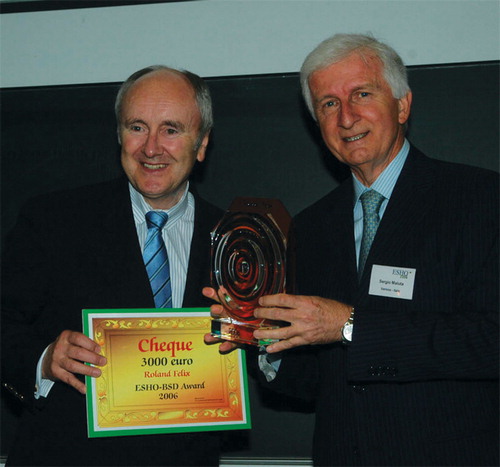ESHO-BSD award
The European Society of Hyperthermic Oncology presents yearly the ESHO-BSD award to one of their members. The ESHO-BSD award is the continuation of the former LUND science award which was given to the first author of the most impressive paper submitted to the International Journal of Hyperthermia. Since 1999 the prize was given to an ESHO-member with special merits for the European Society. Previous winners are: S. Maluta (2005), P. Vaupel (2004), J. J. W. Lagendijk (2003), R. Issels (2002), D. Gonzalez-Gonzalez (2001), P. Wust (2000) and J. van der Zee (1999).
This year the Award Committee, after a careful evaluation and recognition, approved the proposal to give the ESHO-BSD award to Professor Roland Felix who, in 1987, started to evaluate hyperthermia, for his very special merits in this topic.
Curriculum vitae of Professor Roland Felix
1956–1962: Study of Medicine at the Universities of Berlin, Zurich and Munich.
1970–1979: Certification as a Consultant for Radiology and Radiation Medicine, appointment to a Professor at the University of Bonn, acceptation of the Appointment to the chair of Radiology of the Free University of Berlin, provisional Director of the Department of Radiology, University Hospital Steglitz, Free University Berlin.
1984–1990: Deputy Medical Director of the University Hospital Charlottenburg, first prize of the scientific exhibition of the ‘Radiological Society of North America’ (on occasion of the 70th Scientific Annual Meeting in Washington DC), appointment to the chair of Radiology of the Rheinische Friedrich-Wilhelms-University Bonn, President of European Congress of Magnetic Resonance in Medicine, Berlin and honorary appointment in the Medical Advisory Board of the German Cancer Aid, Bonn (M. Schell Foundation), Deputy Medical Director of the University-Hospital Rudolf Virchow.
1992–2001: President of XI Congress Society of Magnetic Resonance in Medicine, of 6th European BSD Users Conference, and of the course of formation of the German–Polish Radiological Society, Deputy Medical Director of Charitè Berlin, Dean of the Charitè Berlin.
Special merits for ESHO
Professor Felix started to evaluate HT in 1987 with the establishment of a HT unit and investigated HT for a long period of nearly 20 years continuously. From 1994–2002 he made relevant efforts in establishing a large collaborative research project which allowed relevant methodical results in developing TPS and non-invasive MR thermography. From 1996–2000, he collaborated in establishing a unit for whole-body hyperthermia and clinical evaluation of this modality. Furthermore, he evaluated other methods for thermotherapy such as RF-ablation, HIFU, Magnetic Fluid hyperthermia and for the Quality Control in RF. Finally, he strongly supported the installation of the hybrid-system and provided a proof of the principle of this advanced technique.
Professor Felix has more than 70 publications in the field of hyperthermia; many of them as senior author. In conclusion, I’d like to report a comment of Peter Wust: ‘Only his strong and constant encouragement and scientific advice rendered possible the Berlin hyperthermia project and research’. For these reasons the ESHO-BSD award committee selected this professor as recipient of the ESHO-BSD award 2006. We are grateful to Professor Felix for having dedicated part of his life in this promising and expanding therapeutic field. Congratulations Professor Felix!
